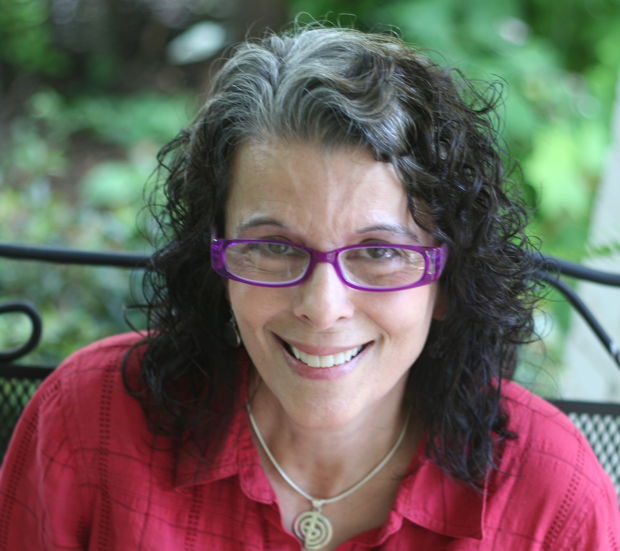Stranded high on a cracking vinyl cushion, I tried not to blink, eyes filling with regret. I’d picked the pixie cut after browsing waiting-room Glamour magazines, but watching six inches of my dark locks lopped off, I thought, Mistake, and as the minutes passed, Disaster. Attractive hair is oxygen to a thirteen-year-old, and my looks defined my nascent personhood. It’s easy to forget the Lord values the heart when living in a community of “mortals look[ing] at the outward appearance” (1 Samuel 16:7).
This began my hair battles, evidence of my feelings of self-loathing. As soon as I got home, I tried fixing the cut by plastering pink Scotch hair-set tape on every wavy chopped tress in futile attempts to get my natural texture to stay down. This proved to be a disaster, showing in the mirror as an odd bubble-gum-pink crown of Band-Aid-sized strips above a tear-streaked brown face.
The difficulties of becoming friends with one’s self are real. During college I experienced the added hardship of undiagnosed depression and often forgot to take care of my hair or even brush it. But I kept praying, Help me, Lord. I made baby-steps towards self-care as I turned my struggles over to Christ and was given the joy of looking outward. My lifelines became the incredibly interesting people I met and loved, even as I secretly hated myself.
Fast-forward past years of studying, living alone (and lonely) with my nose in a book or my eyes fixed on index cards with Bible verses, growing (as Thoreau says) like corn in the night. Then, at twenty-nine, I was blessed as one of the incredibly interesting people I had met and loved became my husband, and his agape love helped teach me slowly, surely that I could love myself.
So when my hair began curling in my thirties, I let it curl and loved it. Getting ready became simple. No more blow-drying, just wash it at night, air dry, and wet it in the morning. But a new problem arose — I couldn’t tweeze out the too-many errant gray hairs anymore. I then did the unthinkable when my daughter entered kindergarten: coloring my hair at a salon. When the stylist asked, “You want red highlights to match your natural ones?” I saw I’d missed appreciating my original God-given gift. My hair has always been a symbol for my life.

Photo credit: Katherine Butcher
That first salon bill persuaded me, a stay-at-home mom on limited budget, to color my hair in the bathroom. After a decade of that overpowering ammonia, I started using non-ammonia dyes, and we got along well for some time, apart from the mess. But recently I was pushing a cart down Kroger’s hair-dye aisle, passing the neatly lined up boxes with their life-enhancing promises — Clairol’s Perfect10 and L’Oreal’s Excellence — when I realized I was totally fed up with dyeing my hair. I wanted gray hair. My hunger for perfection starved to death some time ago, and I realized I also no longer cared about the culture’s obsession with youth. I wanted simplicity, freedom, joy in being who I am.
So I did what most of us do before we make a decision — I googled “going gray.” Then I visited my hair stylist Crystal, who had years ago solved that decades-old mystery of why-did-my-pixie-cut-look-so-unbecoming-on-me, explaining, “You and I have the same long face shape. It doesn’t work with short hair.” I was somewhat apprehensive to tell Crystal I wanted to go gray because she had been dyeing my hair on occasion, when I wanted it to look extra professional before talks, workshops, and retreats; however, she was delighted, said my “sterling silver” hair would do well, and described ways to handle the transition, agreeing that letting it grow for eight months would be the best start.
I’m excited about this new companionship with something as simple as my hair. It shows a huge change in me wrought by Christ’s grace. I no longer experience the intense self-hatred I did for decades, nor the depression, which through counseling I came to understand as a serious medical illness like heart disease or high blood pressure, requiring medical treatment. And I learned (and learn anew today) to honor God’s gift of life, no longer apologizing to everyone for everything but saving apologies for real occasions of injury. I am embracing the music of my life that will always have a strong bass line, like good jazz.
So as my perhaps culturally-questionable gray adventures unevenly across my head, I’m dancing inside, a fifty-something woman happy to be alive and flawed, praying to become softer-souled. My life’s journey is in each strand of gray — the good, the bad, the raw — and I’m thankful for each one. This new peace is both hard-won and also God’s amazing grace.
Proverbs reminds, “Gray hair is a crown of glory, gained in the way of righteousness” (16:31). This “way of righteousness” means my gray hair flourishes — not as a diadem of human accomplishment, but as time’s prize to a much-loved beggar walking the path of forgiven fallenness. So I press ahead, covered ever more in graceful gray, praying daily for wisdom because “God . . . gives generously to all without finding fault” (James 1:5).